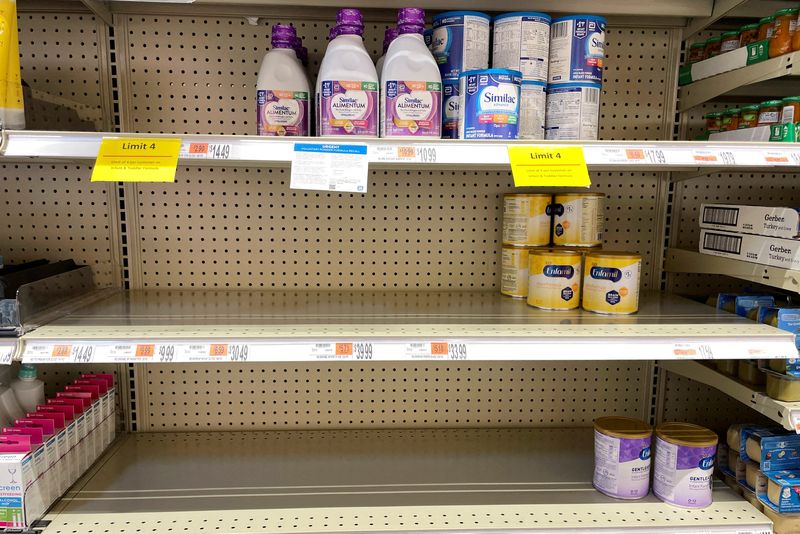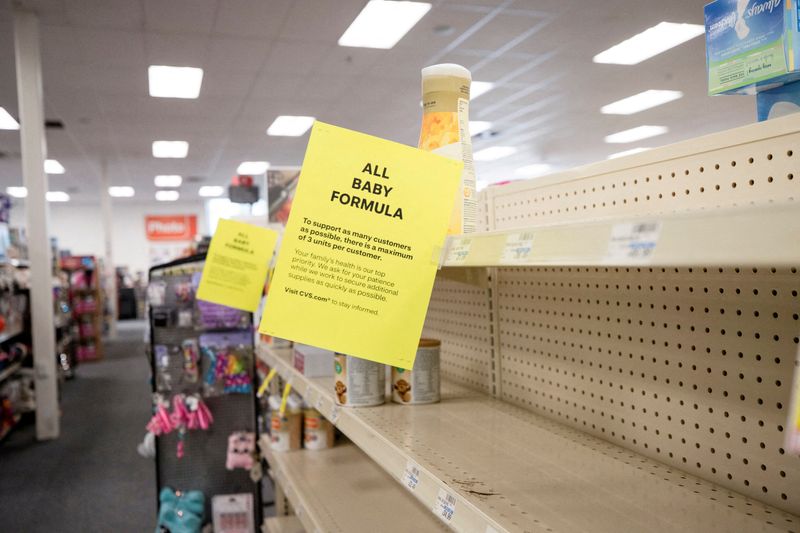By Ahmed Aboulenein and Manas Mishra
WASHINGTON (Reuters) -Lawmakers grilled U.S. Food and Drug Administration officials on Wednesday over what they saw as a lack of urgency in the agency's response to complaints about possible baby formula contamination at a now shuttered Abbott Laboratories (NYSE:ABT) plant that led to severe nationwide shortages.
FDA leaders appeared before a congressional panel to answer questions about the crisis after Abbott in February recalled some products and closed its manufacturing plant in Sturgis, Michigan.
"There are also questions surrounding the timeline of FDA's investigation and response," said Representative Diana DeGette, chairwoman of the U.S. House of Representatives Commerce and Energy Subcommittee on Oversight and Investigations.
The Democrat cited "a four-month lapse before returning to inspect the Sturgis facility," and a delay in contacting a former Abbott employee whistleblower.
Senior leaders like then-acting Commissioner Janet Woodcock and Deputy Commissioner for Food Policy and Response Frank Yiannas only saw the complaint in February because of pandemic-related mail routing issues, FDA officials said.
"FDA's timeliness of interviewing the whistleblower and getting into the facility for a for-cause inspection were too slow and some decisions could have been more optimal," acknowledged FDA Commissioner Robert Califf.
"To my knowledge, there's no malfeasance there. These are people who are working very hard, but we had systems that were failing and decisions that could have been better."
The FDA inspected the plant following reports of bacterial infections in babies potentially linked to Abbott's formula, and the whistleblower complaint in late October.
A COVID outbreak at the plant delayed the inspection until Jan. 31. A second baby's death potentially linked to the plant was reported just after the factory was shuttered in February.
"Frankly, the inspection results were shocking," Califf said, noting that inspectors found cracks in vital equipment, a lack of adequate hand washing, evidence of previous bacterial contamination, and water leaks in areas were formula is produced, a risk factor for bacteria.
The plant is one of three run by Abbott, which has the largest U.S. market share for infant formula, and the company did not have a contingency plan to produce its specialty formulas that serve as the only source of nutrition for thousands of babies with metabolic disorders, the FDA said.
Califf said the best option was to enter into a consent decree agreement with Abbott, "where we literally have oversight of every single step" of remediation of problems at the facility to get it back on line as soon as possible.
Abbott plans to reopen the plant on June 4.

Abbott controlled 40% of the market before the plant closed, Christopher Calamari, president of Abbott U.S. nutrition, told lawmakers, and the plant accounts for 40% of Abbott's product.
Reckitt Benckriser had a 34% market share that grew to 56% since the closure, vice president for nutrition Robert Cleveland told lawmakers. Nestle saw its 8% share grow to 9%, Gerber vice president Scott Fitz said.
